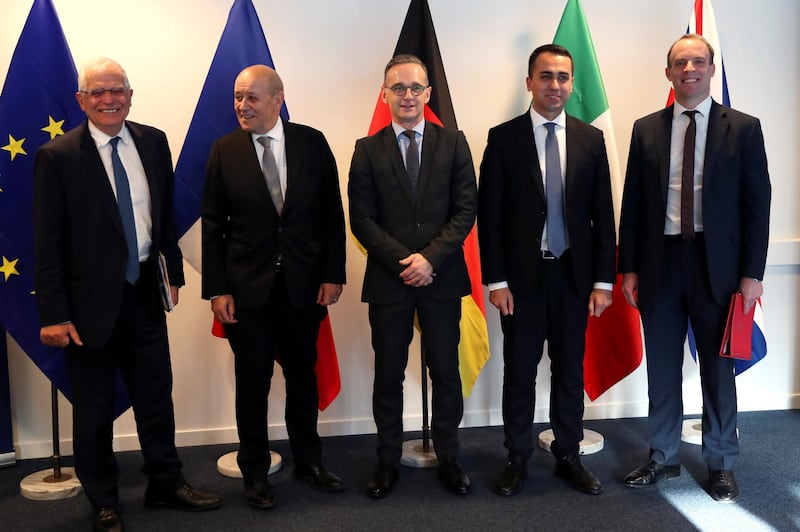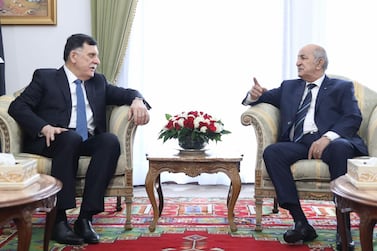Europe’s foreign ministers met in Brussels on Tuesday as the continent scrambles to coordinate its response to escalating tensions between Iran and the US.
Speaking before he headed to the Belgian capital for the talks, British Foreign Secretary Dominic Raab said he was concerned about the possibility of a “full-blown war” with Iran.
"What we're looking to do is to de-escalate the tensions with Iran and make sure in relation to Iraq that we don't lose the hard won gains that we secured against [ISIS]," Mr Raab said.
A foreign office spokesperson told The National the European nations' top diplomats would be meeting to discuss de-escalation in both Iran and Libya.
Europe’s new representative for foreign affairs Josep Borrell along with Mr Raab and the foreign ministers of France, Germany and Italy had been due to meet in Libya on Tuesday.
The discussions in the Libyan capital Tripoli, meant to lay the groundwork for new phase of mediation between the country’s warring factions, were abandoned in part because of security concerns but also because of events in Iraq and Iran.
"We asked for a ceasefire and we asked also to stop escalation and to end external interference, which has been increasing in the last days," EU foreign policy chief Josep Borrell told reporters.
"It is obvious that this made a reference to the Turkish decision to intervene with their troops in Libya, which is something that we reject," he added.
A joint statement after the meetings said: "Continuing outside interference is fuelling the crisis".
"The EU is of the firm conviction that there is no military solution to the Libyan crisis and that a protracted conflict will only bring more misery to ordinary people," they added.
European leaders were left on the back foot by Washington’s decision to kill Islamic Revolutionary Guard Corps Commander Qassem Suleimani in Baghdad last week. None of the US’s European allies were told in advance of the strike despite the likelihood of Iranian retribution and the presence of allied troops in the region.
In a letter to German parliament the country’s defence minister Annegret Kramp-Karrenbauer and the foreign minister Heiko Maas have outlined their government’s decision to reduce troop numbers in Iraq in the wake of Suliemani’s killing.
Washington has been forced to discredit as “inaccurate” a draft letter made public on Monday which appeared to confirm US plans for withdrawal from Iraq.
With Nato also announcing it will suspend its training of Iraqi forces, Ms Kramp-Karrenbauer said Germany wished the international alliance against ISIS to continue. "Whether we can continue our work depends principally on the decision of the Iraqi government. Talks on that are currently ongoing and until then we're reading tea leaves," she said.
Diplomats have indicated European signatories to the 2015 Iran nuclear deal could launch a process leading to renewed UN sanctions on Iran.
In reaction to Suleimani’s killing, as well as promising retaliation, Tehran has said it will renege on parts of the 2015 deal and exceed the limits placed on its uranium enrichment.







